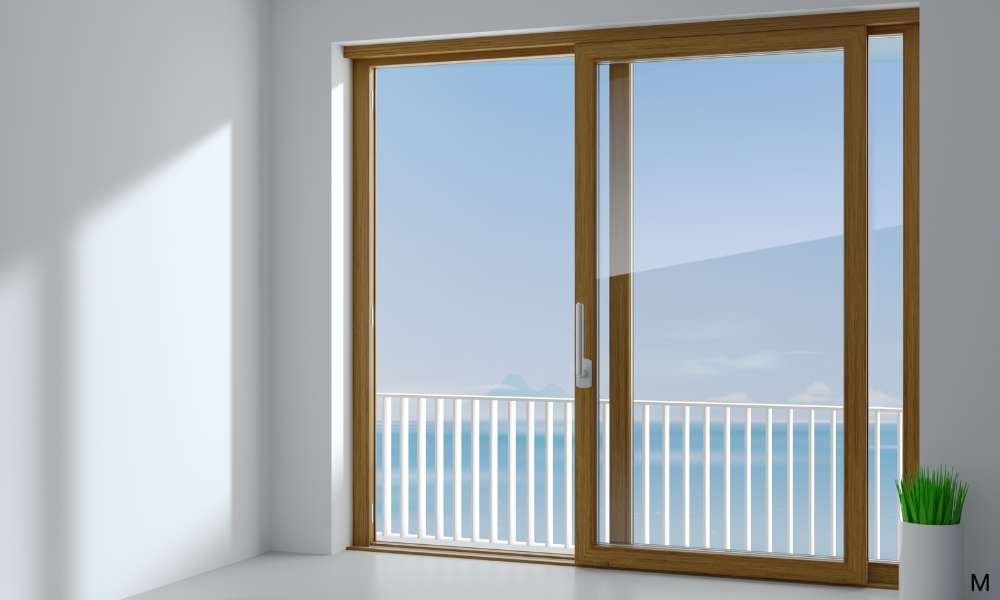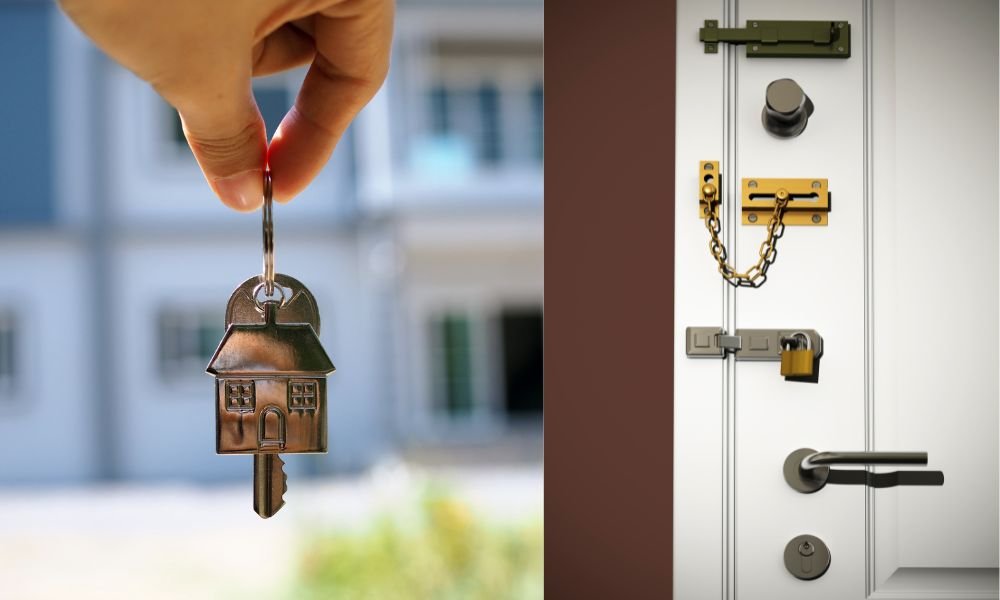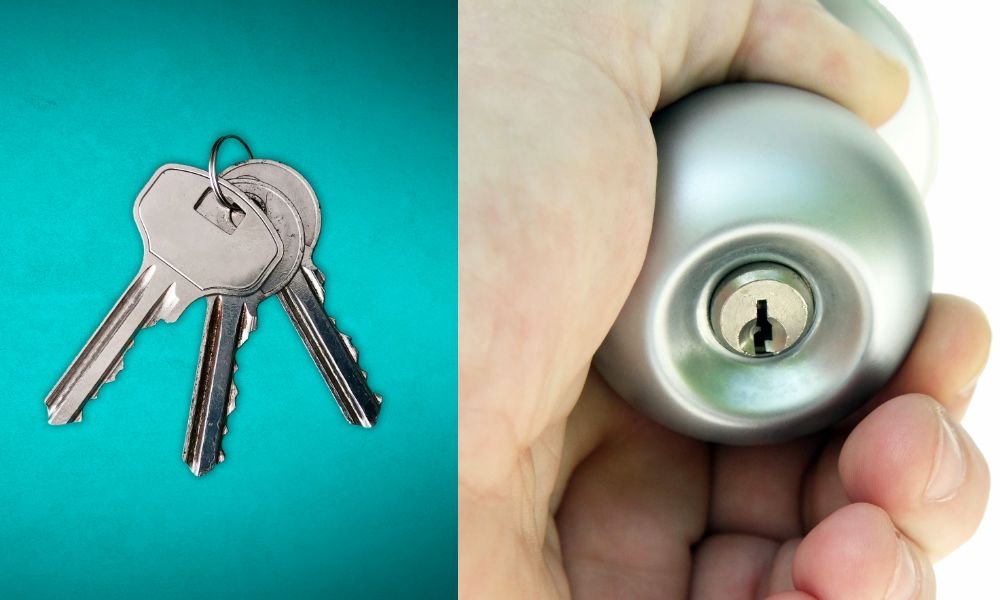Sliding glass doors are a beautiful addition to any home, offering panoramic views and allowing natural light to flood in. However, they can also be a vulnerable point of entry for intruders if not properly secured. In this guide, we’ll explore the importance of securing sliding glass doors and provide practical tips on How to lock sliding glass door.
Importance of Securing a Door
Securing sliding glass doors is crucial for protecting your home and family from potential break-ins. These doors are often targeted by burglars due to their large glass panels and sometimes flimsy locking mechanisms. Without proper security measures in place, the above door can be easily forced open, providing intruders with quick and silent access to your home.
Types of Locks for Sliding Doors
There are several types of locks available to secure sliding glass doors:
A. Surface-Mounted Locks:
These locks are installed on the surface of the door and frame, making them visible from both the inside and outside. They often feature a bolt that extends into the door frame when locked. Surface-mounted locks are easy to install and are available in various styles and finishes to match your door’s aesthetic.
B. Mortise Locks:
Mortise locks are recessed into the edge of the door, providing a sleeker and more discreet appearance. They typically offer enhanced security compared to surface-mounted locks. Mortise locks are more challenging to install and may require professional assistance, but they provide superior protection against forced entry.
C. Keyed Locks:
Keyed locks require a key to lock and unlock the door from the outside, adding an extra layer of security. These locks come in various configurations, including single-cylinder and double-cylinder options. While keyed locks offer excellent security, they can pose a safety hazard in emergency situations if the key is misplaced or inaccessible.
D. Bolt Locks:
Bolt locks are simple yet effective, consisting of a metal bolt that slides into a corresponding hole in the door frame when engaged. These locks are easy to operate and provide reliable security. Bolt locks are typically installed at the bottom of the door and can be supplemented with additional security measures for added protection.
Step-by-Step Guide on Installing a Sliding Glass Door Lock

A. Choose the Right Lock:
Before installing a lock, carefully consider your security needs and the compatibility of the lock with your door. Choose a lock that offers the level of security you desire and is suitable for your door’s construction.
B. Measure and Mark:
Use a tape measure to determine the proper placement of the lock on the door and frame. Mark the locations for drilling holes using a pencil, ensuring that the lock will be centered and aligned correctly.
C. Drill Holes:
Carefully drill holes in the door and frame according to the markings you made earlier, using a drill bit that is appropriate for your lock’s mounting hardware. Take care to avoid damaging the glass or other components of the door during drilling.
D. Install the Lock:
Attach the lock to the door and frame using the provided screws, following the manufacturer’s instructions carefully. Ensure that the lock is securely fastened and properly aligned before tightening the screws.
E. Test the Lock:
Once installed, test the lock to ensure it functions smoothly and securely. Make any necessary adjustments to the alignment or operation of the lock to ensure optimal performance.
Additional Security Measures for Door
In addition to installing a lock, consider implementing the following security measures:
A. Security Bars:
Place adjustable security bars in the track of the sliding door to prevent it from being forced open. These bars provide an extra layer of protection against intrusion and can be easily removed for regular use of the door.
B. Window Film:
Apply shatter-resistant window film to the glass panels to make them more resistant to breakage. Window film strengthens the glass and helps to prevent it from shattering upon impact, making it more difficult for intruders to gain entry.
C. Motion-Activated Lights:
Install motion-activated lights near the doors to deter intruders. These lights illuminate the area around the doors when motion is detected, alerting you to potential threats and deterring would-be burglars from attempting a break-in.
Common Mistakes to Avoid When Locking a Sliding Glass Door
Avoid these common mistakes when securing your glass doors:
A. Neglecting Regular Maintenance:
Failing to maintain locks and tracks can lead to malfunctions and security vulnerabilities. Clean and lubricate your locks regularly to ensure smooth operation and optimal security.
B. Leaving Doors Unlocked:
Always remember to lock your glass doors when leaving the house or going to bed. Even if you are home, keeping the doors locked helps to deter opportunistic intruders and keeps your family safe.
C. Overlooking Weak Points:
Identify and address any weak points in your door’s security, such as loose frames or damaged locks. Inspect your doors regularly for signs of wear and tear, and make any necessary repairs or upgrades to improve their security.
Benefits of Using a Professional Locksmith
Professional locksmiths can offer expertise and specialized tools to ensure your doors are properly secured. Benefits of using a locksmith include:
A. Customized Solutions:
Locksmiths can recommend and install security solutions tailored to your specific needs and budget. They can assess your home’s vulnerabilities and provide personalized recommendations for enhancing its security.
B. Quality Installation:
Locksmiths are trained and experienced in installing a wide range of locks and security devices. They can ensure that your locks are installed correctly and securely, providing reliable protection for your home and family.
C. Peace of Mind:
Knowing that your doors are professionally secured can provide peace of mind and added security for your home. Locksmiths stand behind their work and can provide ongoing support and maintenance to keep your doors secure for years to come.
Tips for Maintaining Sliding Glass Door Locks
To keep your sliding glass door locks in optimal condition, follow these maintenance tips:
A. Clean Regularly:
Remove dirt and debris from the locks and tracks regularly to prevent buildup that can affect performance. Use a soft brush or cloth to gently clean the lock mechanism and track, taking care not to use abrasive cleaners that could damage the finish.
B. Lubricate Moving Parts:
Apply a silicone-based lubricant to the lock mechanism and track to keep them operating smoothly. Lubrication reduces friction and wear on the moving parts of the lock, ensuring that it functions properly and extends its lifespan.
C. Check for Wear and Tear:
Inspect the locks and tracks periodically for signs of wear and tear, such as rust, corrosion, or loose screws. Replace any damaged or worn components promptly to maintain the security and functionality of your glass doors.
Conclusion
Securing sliding glass doors is essential for protecting your home and loved ones from potential intruders. By investing in quality locks, implementing additional security measures, and staying vigilant about maintenance, you can enhance the security of your sliding glass doors and enjoy peace of mind knowing that your home is well-protected.



